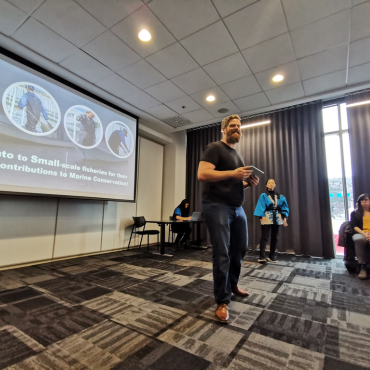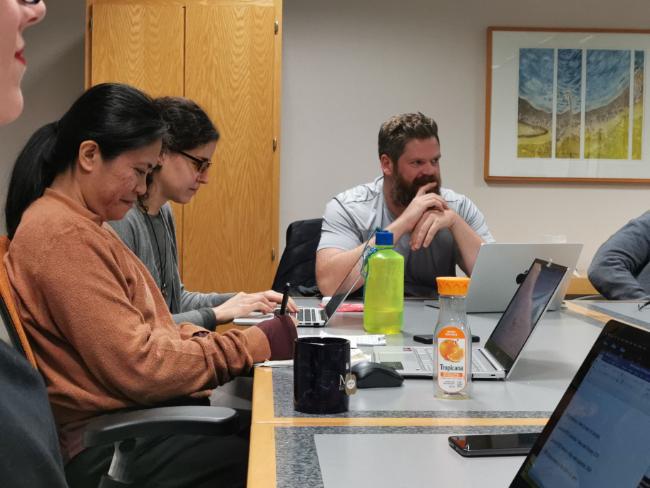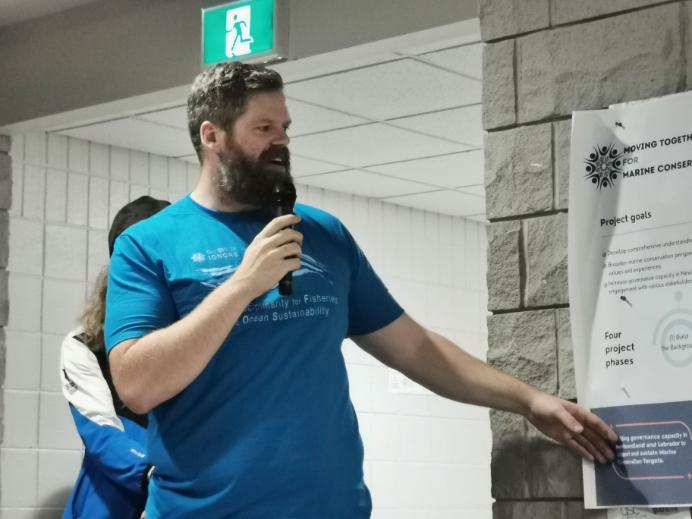Evan Andrews

Banting Postdoctoral Researcher, Geography
What are you currently working on? What's your current research focus?
My research focuses on dialogue, capacity building, and governance for fisheries and oceans, especially considering community perspectives. Together with Dr. Ratana Chuenpagdee, I am the co-principal investigator of Moving Together for Marine Conservation, a multi-year outreach and governance capacity building project. I am also a contributor to the Ocean Frontier Institute, especially Module I, which is about informing governance responses in a changing ocean. The projects help draw attention to the rights, priorities, and values of people living and working on coasts, including in fisheries.
I am keen to understand how different groups talk, collaborate, and govern for sustainable fisheries in a just ocean, particularly in the context of small-scale fisheries, marine conservation, and climate change. My research is engaged and collaborative, with a special focus in Newfoundland and Labrador, as well as Atlantic Canada. I am excited to also engage with colleagues across Canada, focusing on facilitating knowledge and resource sharing from small-scale fisheries research, as the coordinator of the Canadian hub of Too Big To Ignore: A Global Partnership for Small-Scale Fisheries Research.
When and why did you first feel inspired to work in this area?
As part of my Ph.D., I got a chance to come to Newfoundland and Labrador, as a visitor to Dr. Chuenpagdee's International Coastal Network Lab, and then to conduct interviews with people living on the Great Northern Peninsula.
At this time, I began to feel like what I was reading on the pages of academic journals seemed disconnected to what I was seeing in the province. I listened to the stories and reflected on the views and perspectives. Fishers seemed different. Experiences in communities were more complicated. Life on coasts had depth and variety. People felt unheard. In these moments, and in many after, I have been inspired to bring people together to share stories and experiences, and to learn and bridge differences in pursuit of justice and equity.
The academic journals do remind me that changes are taking place and require different ways of governing. The stories of people on coasts keep me committed to coastal communities. The perspectives of people working in different NGOS and governments keep me grounded in the challenges and opportunities for governance change. Together, the prospects for transformation are nurtured in collaborative space where mutual understanding, co-existence and partnership can be formed.

Can you share a memory with us of an interesting day in your recent work/research life?
When you work with people, every day is interesting. My days are often filled with thinking about and talking to people, considering what they are keen on, how to talk to them, and how to bring them together.
My days are awesome because I get to work with Dr. Chuenpagdee and many mentors and colleagues. They keep me excited about important groundwork to foster dialogue and understanding. I get to do all sorts of different things in pursuit of collaboration and partnership. It is really rewarding for these efforts to come together in events, reports, videos, papers, and book projects.
What makes Memorial suited for your work?
Memorial University has a special obligation to the people of Newfoundland and Labrador, and that includes coastal communities. In the context where people are questioning the value of universities, I keep that special obligation as my North Star. I am learning each day from great faculty, staff, and students who know how to make this obligation come to life in impactful and supportive ways, while contributing to knowledge and understanding more broadly.
In research I have recently led, we looked at all the social science and humanities papers about Atlantic coasts and oceans since 2000. It is clear Memorial University has driven a large volume of thoughtful, useful, and impactful research. Commitments and people need to continue and enrich that legacy. While there are always challenges, the supports I have received at this university, along with the potential opportunities, make me feel like I can help contribute, especially through engaged research with coastal communities and the groups that care about them.

Are there any upcoming events or other ways for folks to find out more about what you're doing?
Since I came to Newfoundland for my postdoctoral studies, I have been lucky to help with great events related to our work, and there are exciting events on the horizon: on September 12th, we are hosting Ocean People Inspire, a celebration of the many ways oceans, people, and their inspirations come together.
The event starts at 6:00pm at the Lantern, and is free and open to all. The event will feature diverse perspectives and artistic expressions about the ocean and coasts as well as the people whose lives and work are intertwined with them, and who give special meanings to these places.
You can learn more here: https://moving2conservation.net/ocean-people-inspire/ We hope to see you there!
.png)